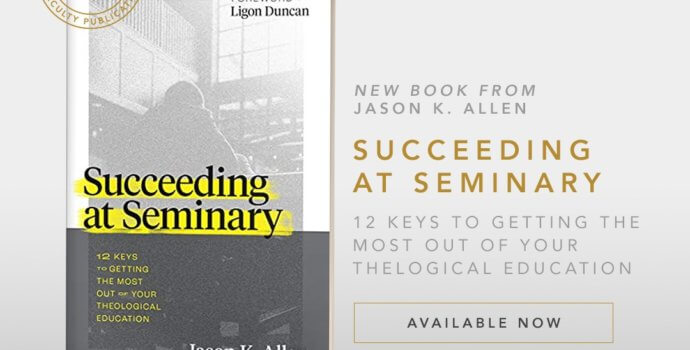A Step of Faith
This post is an excerpt from Succeeding at Seminary: 12 Keys to Getting the Most Out of Your Theological Education by Jason K. Allen. The book is out now from Moody Publishers and wherever Christian books are sold.
TRUST YOUR CALLING
If you believe and see these internal and external confirmations that God has called you to ministry, then seminary training is the next logical step. (If you remain unsettled in your calling, let me point you to my book Discerning Your Call to Ministry, which will help you gain clarity.)
If you are certain, rest in that calling. Know that God has set you apart to serve His church and to advance His gospel. He has a special ministerial plan for your life. The journey will be hard, but it will be spiritually rich and eternally consequential. You can trust your calling, friend, because you know and trust the One who issued it.
TRUST YOUR CHURCH
As we have discussed, no call to ministry is an individual undertaking. The Holy Spirit implants the desire, but the local church assesses and affirms the calling. As Brian Croft puts it, “It is the local church that God has appointed to be the agent to test, train, affirm and send those who are called.” If your church knows you, has observed you, and has affirmed your character and gifting, you should gain confidence in your calling by remembering their confidence in your calling.
Your pastor or elders will be doubly important in this process. As you gather their support for your ministry pursuit and their affirmation for your seminary studies, it should profoundly reassure you. Trust your church, and especially those who lead it.
TRUST YOUR SPOUSE
If you’re married, the most important person in your life is your spouse. You cannot undertake ministry—or seminary training—without their support, and you should not try. Yes, it may take time, prayer, conversation, and deliberation for them to warm to the idea. This will especially be the case if God calls you midlife and your spouse is accustomed to different living circumstances.
Seminary will not just cost you money and time; it will also cost your spouse money and time. Spiritually, then, you must have spousal support. Practically, I couldn’t imagine undertak- ing seminary without it. Conversely, as you have his or her support, and as he or she believes in your calling and is willing to sacrifice for your ministry preparation, it should embolden you. Trust your spouse.
TRUST GOD’S WORD
From cover to cover, your Bible is true and trustworthy. It is pregnant with promises, many of which pertain to submitting to God’s will, following His call, surrendering to His plan, and pursuing His directives. Along with those promises, it should be added, come warnings for those who resist His leadership.
I encourage you to trace God’s scriptural promises related to ministry service, His care for prophets and preachers, and His assurances of blessing for those who sacrifice for Him. Do not enter seminary doubting God. Gain conviction and confidence in Him from Holy Scripture. His Word is good, and you can trust it.
TRUST YOUR SEMINARY
One sign you’re considering the right institution is that you can trust it. (If you cannot, find one you can.) You should be able to trust it at every level, especially theologically. You should also be able to trust its admissions officers, guidance counsel- ors, financial-aid advisors, and other seminary personnel.
Of course, seminary personnel believe in their institution and are persuasive in promoting it. Admissions officers aren’t paid to talk people out of coming, after all. But upright institu- tions do not coerce. At Midwestern Seminary, we often deny or delay admission to students for spiritual, academic, or other wise reasons. Though not the ultimate arbiters, your pursuit of seminary can be reinforced by an institution that finds you worthy of admission. Find a seminary you can trust.
TRUST THE LORD!
Finally, and most importantly, trust the Lord who called you. He promised to build His church, and He’s done so for two thousand years. He promised to raise up ministers and missionaries for His church, and He’s done so for two thousand years. The Lord’s church is unstoppable. His commitment to calling out ministers is undeterred.
If He is calling you, therefore, know you have the authority of Christ behind you, the power of Christ within you, and the message of Christ upon you. The risen Lord has never failed His church or His ministers—and He is not going to start with you.
Let me end this book by dispelling a common notion that hinders many from attending seminary now. It is so easy to think the next season of life will prove simpler, less complicated, or more conducive to seminary training. For most all of us, however, that is just not the case.


Comments are closed.